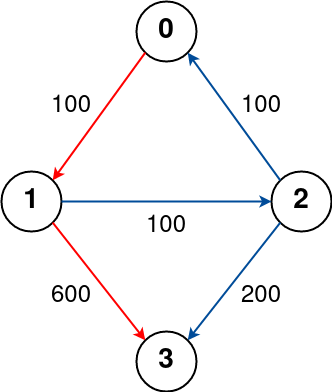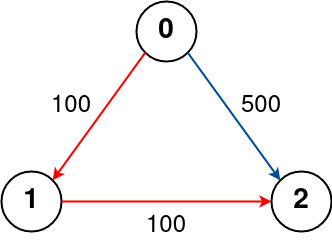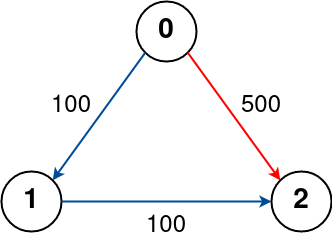2023-01-26 Daily Challenge
Today I have done leetcode's January LeetCoding Challenge with cpp.
January LeetCoding Challenge 26
Description
Cheapest Flights Within K Stops
There are n cities connected by some number of flights. You are given an array flights where flights[i] = [fromi, toi, pricei] indicates that there is a flight from city fromi to city toi with cost pricei.
You are also given three integers src, dst, and k, return the cheapest price from src to dst with at most k stops. If there is no such route, return -1.
Example 1:

Input: n = 4, flights = [[0,1,100],[1,2,100],[2,0,100],[1,3,600],[2,3,200]], src = 0, dst = 3, k = 1 Output: 700 Explanation: The graph is shown above. The optimal path with at most 1 stop from city 0 to 3 is marked in red and has cost 100 + 600 = 700. Note that the path through cities [0,1,2,3] is cheaper but is invalid because it uses 2 stops.
Example 2:

Input: n = 3, flights = [[0,1,100],[1,2,100],[0,2,500]], src = 0, dst = 2, k = 1 Output: 200 Explanation: The graph is shown above. The optimal path with at most 1 stop from city 0 to 2 is marked in red and has cost 100 + 100 = 200.
Example 3:

Input: n = 3, flights = [[0,1,100],[1,2,100],[0,2,500]], src = 0, dst = 2, k = 0 Output: 500 Explanation: The graph is shown above. The optimal path with no stops from city 0 to 2 is marked in red and has cost 500.
Constraints:
1 <= n <= 1000 <= flights.length <= (n * (n - 1) / 2)flights[i].length == 30 <= fromi, toi < nfromi != toi1 <= pricei <= 104- There will not be any multiple flights between two cities.
0 <= src, dst, k < nsrc != dst
Solution
class Solution {
using pi = pair<int, int>;
vector<vector<pi>> neighbors;
public:
int findCheapestPrice(int n, vector<vector<int>>& flights, int src, int dst, int k) {
neighbors.resize(n);
for(const auto &flight : flights) {
neighbors[flight[0]].push_back({flight[1], flight[2]});
}
vector<int> costs(n, INT_MAX);
queue<pi> q;
q.push({0, src});
k += 1; // k stops means path contains at most k + 2 cities
while(q.size() && k--) {
int sz = q.size();
// cout << k << ':' << sz << endl;
for(int _ = 0; _ < sz; ++_) {
auto [cost, current] = q.front();
q.pop();
for(const auto &[next, price] : neighbors[current]) {
if(cost + price >= costs[next]) continue;
costs[next] = cost + price;
q.push({cost + price, next});
}
}
}
return costs[dst] == INT_MAX ? -1 : costs[dst];
}
};
// Accepted
// 52/52 cases passed (32 ms)
// Your runtime beats 59.58 % of cpp submissions
// Your memory usage beats 75.69 % of cpp submissions (13.1 MB)